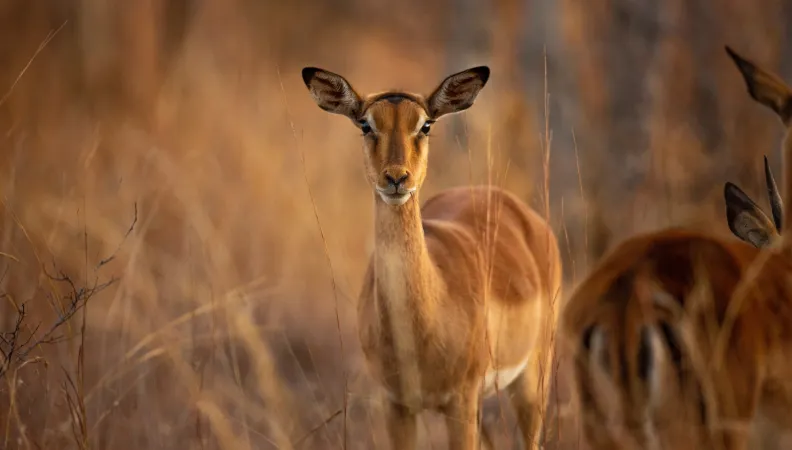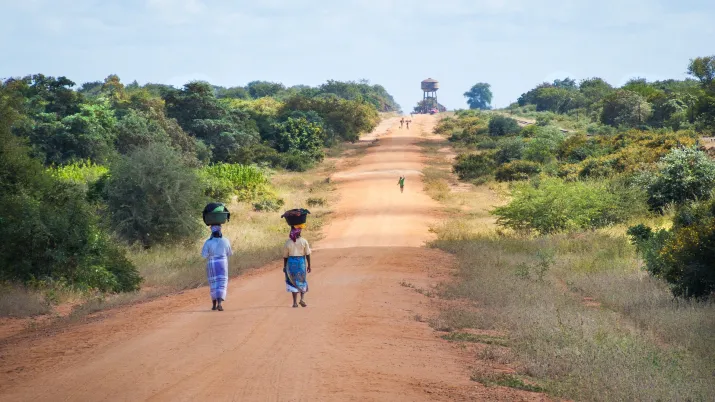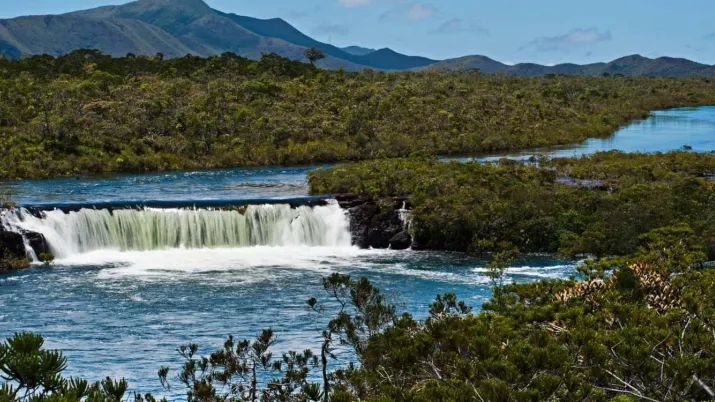Share the page
Studying wildlife economy to mainstream biodiversity into agricultural policies in South Africa and Kenya

-
Project start date
-
2022Status
Ongoing
-
Project end date
-
2024
-
AFD financing amount
-
220 393
-
Country and region
-
Partners
-
African Conservation Centre (ACC), African Game Ranchers Association (AGRA), Department of Agriculture, Land Reform and Rural Development (South Africa), Department of Forestry, Fisheries and the Environment (South Africa), South African National Biodiversity Institute (SANBI), United Nations Development Programme (UNDP), Nelson Mandela University, Stellenbosch University, Rhodes University
-
Research program
The ECOPRONAT programme explores the levers for mainstreaming biodiversity into different economic sectors. As part of this research programme, AFD is working with the South African National Biodiversity Institute (SANBI) to connect agricultural and ecosystem conservation issues in an innovative way, by studying the business models of wildlife ranches as well as the levers for developing wildlife economy.
Context
South Africa’s Department of Agriculture, Land Reform and Rural Development assists persons (or their descendants) who were excluded the formal agriculture economy on the basis of their skin colour, and who have recently begun to engage in farming with the support and assistance of the State. This broad policy is implemented through the Land Reform Programme, where Recapitalisation and Development funding (Recap) is used to help land reform beneficiaries establish viable enterprises. However, this programme remains focused on traditional models of crop and livestock systems.
The consortium of researchers assembled by the South African National Bioinformatics Institute (SANBI) argues that the Land Reform Programme would benefit from integrating the ecosystem services paradigm to help reduce inequality and understand the benefits of land transfer more holistically (Clements et al. 2021). This research consortium is working to integrate wildlife economy enterprise development within the Recap scope of investment.
More specifically, the research project focuses on wildlife ranching, which can be defined as the breeding and commercial use of wild animals for hunting, game meat production, live animal trading or ecotourism. This economic activity can be an interface between conservation and agriculture but, although anchored for many years in South Africa, it remains little studied. Decision-makers thus lack data on the functioning of this wildlife economy as well as its socio-economic and environmental impacts.
Developing knowledge and decision support tools on this wildlife economy with the support of the ECOPRONAT programme is therefore an opportunity for better management of agricultural land and natural ecosystems, for the benefit of beneficiaries of the Land Reform Programme. The survey methodology and lessons learned in South Africa will be used for exchanges with Kenyan authorities who are also conducting studies on the role of wildlife economy in that country.
This project is part of the ECOPRONAT research programme, which supports research on how to better take into account biodiversity and mainstream it into key economic sectors.
Objectives
This project aims to support the development of agricultural policies in Africa that are sustainable on the long-term, and to develop wildlife economy research in South Africa and Kenya. Through its work, the research consortium aims to produce knowledge and tools to enable a large-scale transition, going from a land use that degrades ecosystems to profitable wildlife enterprises that restore natural capital, create jobs and catalyze investment to expand conservation areas.
To this end, the project aims to:
- Develop foundational knowledge for the wildlife economy to facilitate its mainstreaming into agricultural and biodiversity public policies (production of data on business models, their viability, investment and skills development needs, etc.);
- Co-produce decision support tools that enable local actors, companies and public authorities to adapt their policies and investments and create a systemic impact;
- Create a regional community of practice to strengthen research capacity in the South and the development of the wildlife economy. Two master’s students are involved in this project, led by SANBI in partnership with the South African Universities of Rhodes, Stellenbosch and Nelson Mandela.
Method
This research project is based on participatory knowledge building (including training workshops) and on the development of survey methods to collect social, economic and ecological data. This information will be used to produce decision-support tools. In particular, a geospatial selection tool will be developed to identify the actions and investments to be undertaken.
The methodology consists of collecting data from the established wildlife ranching industries established in South Africa and Kenya, on the contributions of the wildlife industry to biodiversity, land restoration and socio-economic development. Through statistical analysis and data visualization, the team will convert this information into knowledge products to make it more accessible, and then into decision support tools to assist new and emerging farmers to create businesses in the wildlife economy and thus expand the wildlife ranching estate.
Results
The research team has published academic articles on the functioning of the wildlife economy and its socio-economic and environmental impacts:
- Clements, H.S., Child, M.F., Lindeque, L. et al. Lessons from COVID-19 for wildlife ranching in a changing world, Nature Sustainability 5, 1040–1048 (2022).
- Denner, C., Clements, H. S., Child, M. F., & De Vos, A. (2024). The diverse socioeconomic contributions of wildlife ranching, Conservation Science and Practice, 6(7), e13166.
The team collaborated with public authorities to ensure that this information could be used by local stakeholders. Their data, gathered from surveys with a representative sample of wildlife ranchers, fed into fact sheets on the wildlife economy published by South Africa’s Department of Forestry, Fisheries and the Environment (DFFE). These are available on the Biodiversity Sector Investment platform, which aims to inform South African citizens and investors interested in engaging in this type of activity.
The research has also informed local decision-making, notably in the revision of the National Biodiversity Economy Strategy and related debates on the sustainable use of biodiversity for economic purposes.
Finally, the team shared its findings with a broader audience through The Conversation Africa, analyzing how different wildlife use models can contribute to local development and the inclusion of disadvantaged communities.
Lessons learned
Several findings have emerged from this research project:
Researchers have demonstrated that wildlife-based land uses support higher biodiversity levels, citing a number of scientific studies that assess their impact in South Africa and other southern African countries. Some of these studies show that wildlife ranching can support higher densities of wild animals per hectare than conventional agriculture or livestock farming.
- Shumba, T., De Vos, A., Biggs, R., et al. (2020). Effectiveness of private land conservation areas in maintaining natural land cover and biodiversity intactness. Global Ecology and Conservation, 22, e00935.
- Taylor, W. A., Child, M. F., Lindsey, P. A., et al. (2021). South Africa’s private wildlife ranches protect globally significant populations of wild ungulates. Biodiversity and Conservation, 30(13), 4111–4135.
- Saayman, M., van der Merwe, P., & Saayman, A. (2018). The economic impact of trophy hunting in the South African wildlife industry. Global Ecology and Conservation, 16, e00510.
- Lindsey, P. A., Romanach, S. S., & Davies‐Mostert, H. T. (2009). The importance of conservancies for enhancing the value of game ranch land for large mammal conservation in southern Africa. Journal of Zoology, 277(2), 99–105.
The research team identified six primary wildlife ranching business models in South Africa, and assessed their employment potential, profitability, and socio-economic impacts:
- Three specialized models: ecotourism; trophy hunting; wildlife breeding
- Three mixed models: mixed hunting (meat and trophy); wildlife breeding combined with agriculture; trophy hunting combined with game meat production
Specialized models, particularly trophy hunting and ecotourism, tend to be more profitable and generate more high-quality jobs than mixed-use or production-focused models (e.g., game meat hunting or livestock farming):
- Employment: Ecotourism ranches employ more people per hectare and offer more skilled jobs and opportunities for women than conventional agriculture or mixed models. Trophy hunting ranches rank second in employment per hectare, although roughly one-third of these jobs are seasonal. Both models offer significant non-wage benefits to employees.
- Profitability: Trophy hunting is the most profitable model, with a median profit margin of 33%. Wildlife breeding is less profitable and contributes less to employment compared to the other two specialized models.
However, specialized models proved to be far less resilient during crises such as the COVID-19 pandemic. In contrast, mixed models—though less profitable—showed greater resilience. The volatility of the hunting and tourism sectors highlights the need for long-term studies and targeted public policy.
In general, ranches focused on ecotourism and trophy hunting stimulate local economies:
- Due to higher operating costs, they purchase more goods and services locally and support a broader ecosystem of businesses.
- They employ more women and offer better wages than conventional agriculture. For instance, in ecotourism-focused ranches, over 40% of staff are women.
- While concerns about job precarity exist, most positions are permanent—except in trophy hunting, where seasonal work is more common. Higher wages and more stable jobs help reduce economic vulnerability.
However, specialized models require large tracts of land and substantial infrastructure, which can be a barrier to entry for disadvantaged South Africans. Conversely, more accessible mixed models may enhance social inclusion and offer historically marginalized groups opportunities to participate in a wildlife economy that also supports biodiversity better than conventional farming systems.
The researchers recommend that policymakers recognize the diversity of wildlife ranching models in order to better integrate them into conservation and sustainable development strategies.
Contact
-
Julien CALAS
Research Officer on Biodiversity



